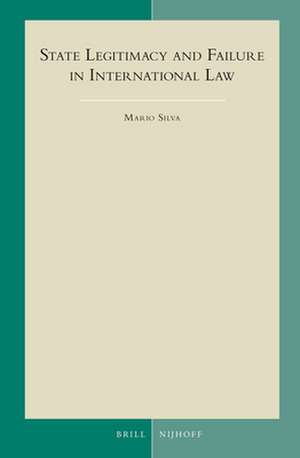State Legitimacy and Failure in International Law: Developments in International Law, cartea 67
Autor Mario Silvaen Limba Engleză Hardback – 5 feb 2014
Through scholarly consideration, State Legitimacy and Failure in International Law evaluates gaps in structural competency that precipitate state failure and examines the resulting consequences for the world community
Din seria Developments in International Law
-
 Preț: 394.46 lei
Preț: 394.46 lei - 15%
 Preț: 633.56 lei
Preț: 633.56 lei - 18%
 Preț: 1312.42 lei
Preț: 1312.42 lei - 18%
 Preț: 1058.00 lei
Preț: 1058.00 lei - 18%
 Preț: 1267.79 lei
Preț: 1267.79 lei - 18%
 Preț: 1269.57 lei
Preț: 1269.57 lei - 18%
 Preț: 794.82 lei
Preț: 794.82 lei - 18%
 Preț: 1001.71 lei
Preț: 1001.71 lei - 15%
 Preț: 352.20 lei
Preț: 352.20 lei - 18%
 Preț: 674.76 lei
Preț: 674.76 lei - 18%
 Preț: 700.59 lei
Preț: 700.59 lei - 18%
 Preț: 703.94 lei
Preț: 703.94 lei - 18%
 Preț: 1204.99 lei
Preț: 1204.99 lei - 18%
 Preț: 879.06 lei
Preț: 879.06 lei - 18%
 Preț: 1210.58 lei
Preț: 1210.58 lei - 18%
 Preț: 780.16 lei
Preț: 780.16 lei - 18%
 Preț: 636.27 lei
Preț: 636.27 lei - 18%
 Preț: 904.01 lei
Preț: 904.01 lei - 18%
 Preț: 793.30 lei
Preț: 793.30 lei - 18%
 Preț: 957.99 lei
Preț: 957.99 lei - 18%
 Preț: 1177.96 lei
Preț: 1177.96 lei - 18%
 Preț: 795.99 lei
Preț: 795.99 lei - 18%
 Preț: 746.90 lei
Preț: 746.90 lei - 18%
 Preț: 1716.52 lei
Preț: 1716.52 lei - 18%
 Preț: 834.97 lei
Preț: 834.97 lei - 18%
 Preț: 819.57 lei
Preț: 819.57 lei - 18%
 Preț: 736.37 lei
Preț: 736.37 lei - 18%
 Preț: 613.67 lei
Preț: 613.67 lei - 18%
 Preț: 775.74 lei
Preț: 775.74 lei - 18%
 Preț: 575.27 lei
Preț: 575.27 lei - 18%
 Preț: 807.28 lei
Preț: 807.28 lei - 18%
 Preț: 703.53 lei
Preț: 703.53 lei - 18%
 Preț: 763.68 lei
Preț: 763.68 lei - 18%
 Preț: 688.99 lei
Preț: 688.99 lei - 18%
 Preț: 1258.04 lei
Preț: 1258.04 lei - 18%
 Preț: 862.54 lei
Preț: 862.54 lei - 18%
 Preț: 838.45 lei
Preț: 838.45 lei - 18%
 Preț: 639.18 lei
Preț: 639.18 lei
Preț: 651.77 lei
Preț vechi: 794.84 lei
-18% Nou
Puncte Express: 978
Preț estimativ în valută:
124.83€ • 128.61$ • 104.57£
124.83€ • 128.61$ • 104.57£
Carte indisponibilă temporar
Doresc să fiu notificat când acest titlu va fi disponibil:
Se trimite...
Preluare comenzi: 021 569.72.76
Specificații
ISBN-13: 9789004268838
ISBN-10: 9004268839
Pagini: 272
Dimensiuni: 155 x 235 x 20 mm
Greutate: 0.57 kg
Ediția:VIII, 272 Pp.
Editura: Brill
Colecția Brill | Nijhoff
Seria Developments in International Law
ISBN-10: 9004268839
Pagini: 272
Dimensiuni: 155 x 235 x 20 mm
Greutate: 0.57 kg
Ediția:VIII, 272 Pp.
Editura: Brill
Colecția Brill | Nijhoff
Seria Developments in International Law
Cuprins
Introduction
Part I: The Origins of State Formation
Chapter 1: The Creation of the State in International Law - Historical Background
1.1 Criteria and Conditions for Statehood
1.2 Emergence of the Modern State System
Chapter 2: State Failure – Internal and External Factors
2.1 Defining State Failure
2.2 Causes and Structural Indicators
2.3 Legacy of Colonialism
2.4 Terrorism
2.5 Limitations in Measuring State Failure
Part II: State Obligations and the Enforcement of International Law
Chapter 3: International Human Rights Law
3.1 Human Rights Instruments
3.1.2 Humanitarian Law
3.2 Human Security – An emerging paradigm
Chapter 4: State Responsibility - Obligations to Prosecute
4.1 Principle of Universal Jurisdiction
4.2 Humanitarian Intervention
4.3 Practice of the Security Council – opinio juris
Part III: Reconstruction and Mobilizing the International Community
Chapter 5: Prevention and Rehabilitation: Strengthening States Against Failure
5.1 State-Building and Reconstruction
5.2 Building Rule of Law
5.3 Establishing Accountability – Ending impunity
5.4 Establishing Security
5.5 Disarmament and Demobilization
5.6 Economic and Social Reconstruction
5.7 Role of Civil Society – Women and Minorities
5.8 Reconstituting Political Structure and Legitimacy
5.9 Reconciliation – Transitional Justice
5.10 Lessons Learned
Chapter 6: Challenges for the International Community
6.1 Role of United Nations
6.1.1 Humanitarian Assistance
6.1.2 Peacekeeping and Conflict Prevention
6.1.3 Transitional Occupation
6.2 Institutional Reform, Trusteeship – Limited Sovereignty
General Conclusion
Part I: The Origins of State Formation
Chapter 1: The Creation of the State in International Law - Historical Background
1.1 Criteria and Conditions for Statehood
1.2 Emergence of the Modern State System
Chapter 2: State Failure – Internal and External Factors
2.1 Defining State Failure
2.2 Causes and Structural Indicators
2.3 Legacy of Colonialism
2.4 Terrorism
2.5 Limitations in Measuring State Failure
Part II: State Obligations and the Enforcement of International Law
Chapter 3: International Human Rights Law
3.1 Human Rights Instruments
3.1.2 Humanitarian Law
3.2 Human Security – An emerging paradigm
Chapter 4: State Responsibility - Obligations to Prosecute
4.1 Principle of Universal Jurisdiction
4.2 Humanitarian Intervention
4.3 Practice of the Security Council – opinio juris
Part III: Reconstruction and Mobilizing the International Community
Chapter 5: Prevention and Rehabilitation: Strengthening States Against Failure
5.1 State-Building and Reconstruction
5.2 Building Rule of Law
5.3 Establishing Accountability – Ending impunity
5.4 Establishing Security
5.5 Disarmament and Demobilization
5.6 Economic and Social Reconstruction
5.7 Role of Civil Society – Women and Minorities
5.8 Reconstituting Political Structure and Legitimacy
5.9 Reconciliation – Transitional Justice
5.10 Lessons Learned
Chapter 6: Challenges for the International Community
6.1 Role of United Nations
6.1.1 Humanitarian Assistance
6.1.2 Peacekeeping and Conflict Prevention
6.1.3 Transitional Occupation
6.2 Institutional Reform, Trusteeship – Limited Sovereignty
General Conclusion
Notă biografică
Dr. Mario Silva, Ph.D. is an international legal scholar, a former Canadian Parliamentarian and the 2013 Chair of the International Holocaust Remembrance Alliance. He is a graduate of Oxford University and NUI Galway and has been decorated by the governments of Brazil, France and Portugal.
